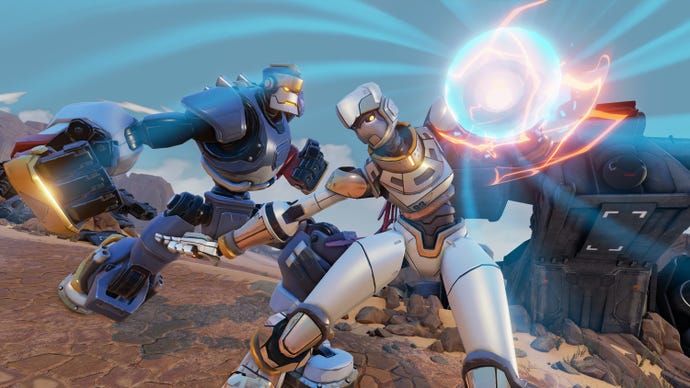Seth Killian Interview: Evolving the Fighting Game Genre
With decades of fighting game experience under his belt, Seth Killian is looking to change some fundamental principles of the genre with an all-new beat 'em up.
This article first appeared on USgamer, a partner publication of VG247. Some content, such as this article, has been migrated to VG247 for posterity after USgamer's closure - but it has not been edited or further vetted by the VG247 team.
To say Seth Killian is a fighting game veteran is a bit of an understatement. During his youth, he spent time earning money in Street Fighter cash games (allegedly averaging around $4000 a month over the summer), and has since spent many years at Capcom honing Street Fighter IV. Indeed, the game's boss character is named after him. He's also the co-founder of the highly popular EVO fighting game tournament series.
After a recent break away from fighting games, he's decided to return with a new title – Rising Thunder – that he hopes will evolve the genre into something new and more accessible for players. I talked to him about his game and what he hopes to achieve.
Tell me the backstory of how you came to this point.
"I work at a company called Radiant Entertainment, It's a small indie studio that was started by a couple of friends of mine who I've known for about 20 years and were the co-founders of EVO with me – Tom and Tony Cannon. We met playing fighting games a long time ago. They started the studio to make a game called Stonehearth that's just entered Early Access on Steam, but we decided to make a second game - a fighting game – which is close to our hearts."
"I've taken a break from fighting games for a while. I worked at Capcom for about seven years, and worked on Street Fighter IV. I wanted to try to get fighting games back into the mainstream. They haven't died, but they've faded from public consciousness since the wave of late 90's crap. The genre kind of dried up, and it was important to me to help reinvigorate them."
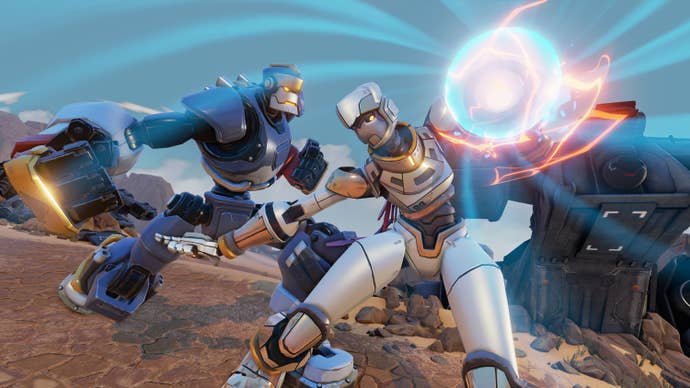
"It more or less worked out, and fighting games are now in a healthy place. When I started thinking about coming back to fighting games, I'd been working at Sony Santa Monica's external studio, which is mostly known for games like Journey and Unfinished Swan. My two big loves are experimental games and fighting games, and I'd started to think about making a new fighting game. However, I didn't want to make just another fighting game. Not because there's anything wrong with that – I love fighting games – but for the most part I thought I'd gotten most of the ideas I wanted to get across in Street Fighter IV. I don't see myself as driven by hitting the same note over and over again, and certainly Capcom is known for hitting some of the same notes – in a great way in some sense. It's tradition. But I wanted to think about fighting games from a perspective of what aren't they doing that I think should be explored and thought about – and is that something I can do and make a contribution to the genre."
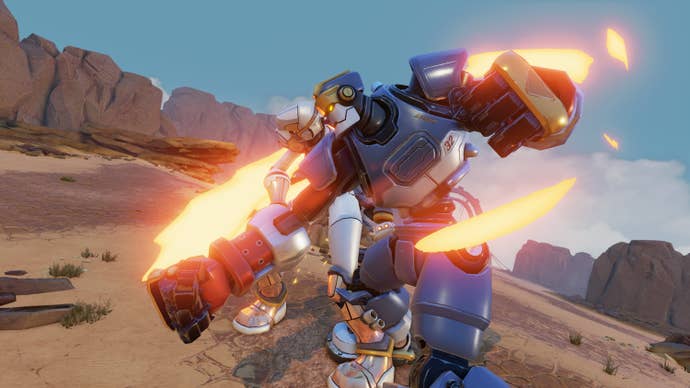
So you want to evolve the genre in some sense?
"Yeah. Straight up. I want to look at the base assumptions around it. What's awesome and exciting about the genre, and what's essential, and what's not. If you'd asked me two years ago, I'd have probably given you a different answer to the one I've come to today. But we did try to strip it down to the basics."
"So I came up with a list of three keystone principles. The easiest two are: these games are hard and take a lot of commitment from the player, and charging $60 up-front to play them and potentially suffer is not good. So we wanted to make the game free. Most of the most competitive games in the world are free, and I believe if you build a fun game, you can build a business around it. We're inspired by games like DOTA and League of Legends. Our commitment is that you can play it forever and not give us a dime. We want to make a game in a world that's fun enough for players to want to participate. The other thing that's missing from fighting games is that the online experience is bad. Most games are designed for local play – the online experience has been an afterthought, and sometimes even degenerate. The way most typical networking code works is particularly bad for fighting games."
"However, my partner Tony Cannon invented a piece of middleware code called GGPO – and this is a boring technical story – but basically it's a rollback piece of net code that he developed specifically for fighting games. He's a very talented engineer, and he made it work for emulated games, and it worked so well that Namco, Capcom, Iron Galaxy and a bunch of companies that make fighting games ended up licensing it."

"So Tony is the pioneer in the genre, and we've built Rising Thunder from the ground up thinking about online. Online is not going to be a thing we bolt onto it. Before we even had a game, we were playing through servers in Oklahoma to have realistic pings and to understand what that experience is like, because if it doesn't sing online, it's nothing."
"The third keystone principle, and most controversial thing, especially in fighting game circles, is to take a really hard look at the execution of special moves. When I think about fighting games, what we think about as the base elements are hidden behind an execution wall. Learning how to be competitive in a fighting game takes at least a month, and oftentimes even longer than that. That's the kind of effort you have to put in to practice and get good at the game and do all the moves. If you don't, then it's like playing chess – but you don't know how to use the rooks or know what the queen does. If you play a game like that, you can have an experience with someone, but it's not really like you're playing chess. To play a good game, you have to know what all the moves are otherwise you're unable to play the game properly."
"In Rising Thunder we want players to be able to take advantage of all the special moves. It's really hard to get to that point in most fighting games – even the basics like being able to throw fireballs and do uppercuts all of the time. I've been playing and teaching people about these games for 20 years. I love the genre so much, and it's changed the way I think about a lot of things. But it makes me sad in a way, because I know for every 20 people I know I talk to, maybe only one will have a similar kind of experience with a fighting game that I will – where it's a deep and rewarding exchange of ideas and a real fight, a really good battle. That's an amazing experience, and that's what keeps the genre strong amongst the devotees – they're having an experience with the game that's completely different to the one most of the people have who touch it. And that makes me sad. I don't look at them as people who are missing out. I just feel bad because I'm secretly asking them to spend months practicing to get to that point. Trust me, the experience you'll have will be so good, it'll retroactively justify all the frustration and losses you've had building up to that point. Maybe that's true, but I think it's an unrealistic request."
"When I look at the combination of those keystone principles, you can understand why fighting games are so weird and niche. First you need $60. Now you can start your training regimen for months, which won't be a lot of fun for a lot of that time. After that point you can play. But now you need a bunch of friends nearby who are on the same page, because online is garbage. When I see those three things together, it's more of a question that how did fighting games survive for so long?"
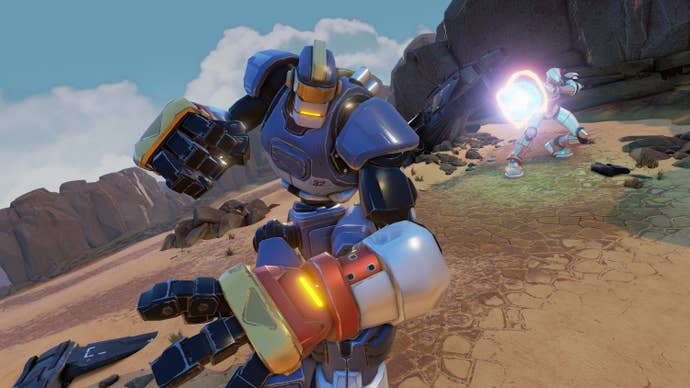
"When you look at the most competitive games in the world, games like DOTA, League of Legends, Counterstrike, Starcraft and those kinds of games, they're intensely competitive. They have a lot of important decision-making, and some have a lot of active arcade skills, but none of them are stuck behind an execution barrier. So the more I started to think about that with fresh eyes to try to understand my own assumptions about fighting games, a bunch of weird historical things started hitting me in the face. Maybe these are all obvious to everyone else, but when I think about fighting games, I think about all the cool things that have come out of fighting games. Things like combos, super-bars, canceling moves into another, unique characters who have special powers and fight one another. All these things have gone far and wide into other games. The one thing that hasn't really gone anywhere are special moves behind an execution wall."
"So we decided to get rid of that. Our commitment was to create a game to have special moves, but not have them behind an execution barrier. We genuinely didn't know whether it would work. We were fairly confident it wouldn't be a crappy game, but we didn't know whether it would work. In the fighting game world, it's crazy to do this. For normal people it's boring, but in the context of fighting games it's definitely crazy. But we built it, and not only did it work, I saw things starting to happen in this game with people who are learning to play the game that I haven't seen in 20 years."
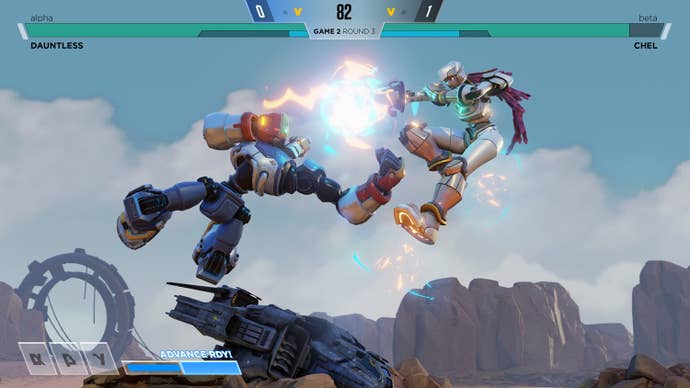
"We have a sysops guy who doesn't really play video games, and he now plays a credible fireball-uppercut game. He's not good, but he's playing the real game, and making decisions. They're often the wrong decisions, but he's making them. Another player I've seen adapt to the game couldn't really play fighting games that well, but after a couple of weeks of playing Rising Thunder – it turns out he's a really smart fighting game player. He just didn't know how to do the moves in other games. He started making legit tournament player-style moves where he was setting me up. He was playing mind games where he'd walk up and throw me a couple of times, and then out came an uppercut when I was expecting another throw. He was setting up an expectation in my mind and then playing against it. And that's the germ of what's amazing about fighting games. That sort of rock-paper-scissors of expectations, situational analysis and whatnot. That to me is the essence of the greatness of fighting games. And that just doesn't happen for most players in other games, because they're sitting there sweating, trying to remember moves and how to do them. It's really difficult."
"Neither of those players are tournament champions, but they're playing the real game, and that's what's so cool about Rising Thunder. There's still a huge element of dexterity and active decision-making – it's not just a flow chart of boxes and watching things just play out. It's really rewarding to see them play that way."
"When I think about great matches in fighting game history, nobody is saying "that player executed all his fireballs without error." It's like saying, "that was a great race, because the jockey didn't fall off his horse." Executing the moves is the base element of the game. When you think about great matches in fighting game history, they're situations where someone did something genius, or read the other player, or set them up to believe something and hammered them for having that false belief. Those are the genius matches – it's all about smart decision-making in the moment. It's not about great execution."
"So the question is, can we have that traditional 2D fighting game experience in a real way, in a core way? A hardcore game, but we'll hold your hand to the point where you don't have to struggle with executing the moves – you just have to struggle with everything else. Will that be the secret ingredient that will help get people over that hump? There are a lot of variables, but Rising Thunder is certainly changing the way people around me are playing fighting games."
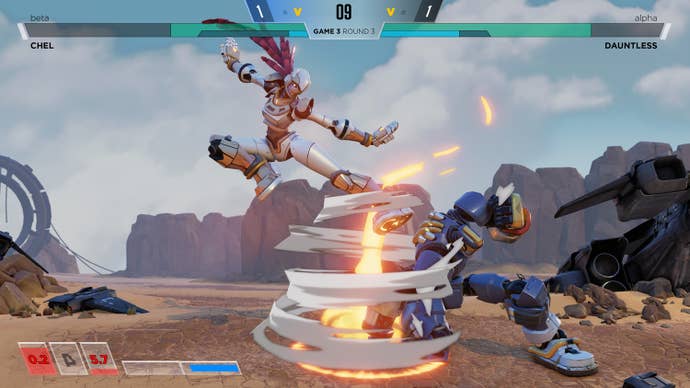
How does it hold your hand in terms of moves?
"It's a PC-only game, and it works on keyboard or joypad. The movement is pretty standard. You have normal attacks that are different at different ranges – the same as Street Fighter. You have dash, jump and diagonal jump, jumping attacks, crouching attacks. Special moves just require a button press. But you can string them all together and get really creative with the inputs. Super-combos also require no special inputs – there's just a meter cost. If you see me jumping and you want to uppercut, you just hit the button."
"This control scheme bypasses all the learning processes you normally have to go through with other fighting games. There's not months of play required to learn the controls. Basically, in my view, competitive games get more interesting and more valuable the more people play them. People will push them further and further and find new ideas and there'll be meta-changes."
Are there fewer moves because of this new system?
"Not really. It depends on which fighting games you compare it to. Rising Thunder has more moves than Street Fighter V, but about 80% of the moves of Street Fighter IV."
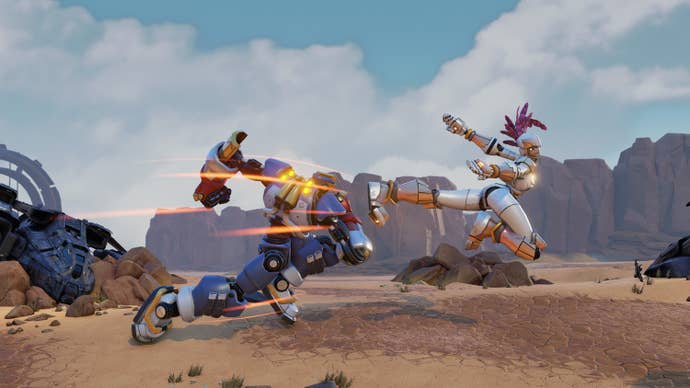
"What's different is that we have loadout slots. It's a variant system that hasn't really been done with fighting games before. You can pick one of three choices for every special move you have. Some of them are nerdy, subtle changes, and some are completely different moves. They're designed around having fun with the character and drawing out character features. For example, our grappler is never going to have a keep-away variant, because that's not what he does. He wants to be up close to grab you. So we find ways to reinforce the character's core style. Grapplers sometimes struggle with being kept out of battle by long-range zoning characters, so there are several moves that you can select that close the gap. They aren't hard counters, but what he might lose in terms of damage and options by taking this move, he gains an advantage in terms of gap closing. So you can pick moves creatively to suit the character or your style. You come into the match not knowing who you're fighting, so you pick something that's fun and good for you. Matches are a best of three games, and that gives players time to learn who they're playing, and their opponent's tendencies. Between games players can switch around a character's loadouts. That gives the potential for mind-games, and the rock-paper-scissors aspect of gameplay. Even if you select the best possible variants, there are no hard counters. It's about small, subtle advantages."
"With the different options, you end up with about a hundred different versions of a character, so that gives a lot of potential for theorycrafting. The normal moves don't change, so the characters always feel familiar. Each character is easy to pick up on a base level – the buttons are the same on a base level for each character. But even if you pick the right variants, you still have to back it up in-game and make smart choices in terms of how you play. There's a theoretical aspect to the game, as well as the practical fighting aspect."
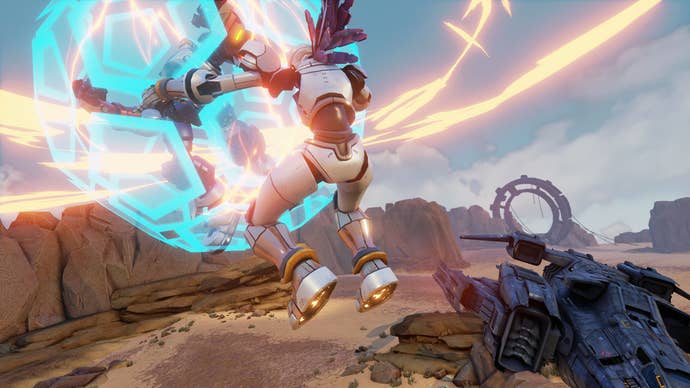
How many characters do you have at the moment?
"We have six characters designed, and another six in development. Most of our time has been spent making online great, and creating the best overall experience. We've spent most of our time building the core fighting engine, and we want to do that first, which will then accelerate character development. We've spent about a year so far with eight people. We know it's not going to win any awards for outstanding visual achievements, but we're concentrating on making the gameplay work as best as possible."
"Matchmaking is also important. You can level up your character, and that's purely for matchmaking purposes. We want to make sure you get players who are entertaining to you, so players of similar level will be matched together. That's really important."
"You have to level to earn the variants for the loadouts. That's not a grindy thing. Like I said, there are 108 different options with a full load of variants, so if I'm asking you to play a character with a full load of variants that you don't know, that's a hard thing. We don't want to hit new people with that. So basically, the more you play, the more you unlock variants. That way, people are introduced to them over time."
At this point I got the chance to test out Rising Thunder for a few minutes – playing as a robotic character, fighting against another mechanoid. I didn't really play it enough to garner anything other than a cursory impression, but it certainly looks promising. It has the feel of a typical Street Fighter game, but being able to instantly access all the combo moves makes it incredibly easy to pick up and play. Within a minute, I was launching combos, chaining together moves and experimenting with tactics. Like Seth says, Rising Thunder essentially bypasses the learning process you normally have with combo-heavy fighting games and pushes you straight into learning how to fight, and getting used to the cadence and timing of the moves, rather than the execution of them. It definitely feels very refreshing in that sense.
Rising Thunder feels solid and well crafted, and even though I didn't play it for long, I essentially picked up the basics in the short time I spent with the game – something that certainly wouldn't have happened with other fighting games. I'm looking forward to spending more time with the game so I can experience the kind of PvP fights its system facilitates. One thing's for sure – so far, so good.
